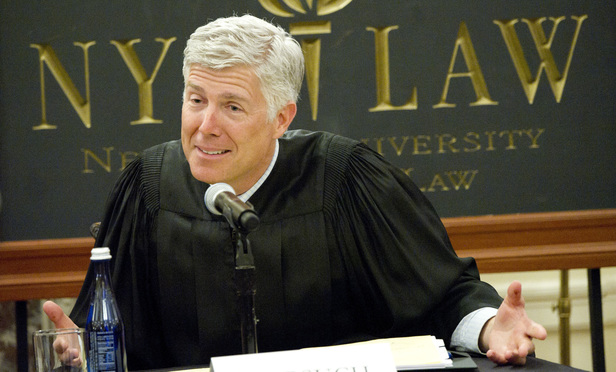President Trump just announced that Neil Gorsuch will be the next SCOTUS. A few notes from Newsweek about Gorsuch.
Originalist
Gorsuch is considered by many to hold a strict originalist interpretation of the U.S. Constitution—he is committed to reading the meaning of the document basically word for word, as he believes the Founding Fathers would have intended it 230 years ago.
Religious Rights
Gorsuch hasn’t written a ruling specifically dealing with Roe v. Wade, but he is known to have strong opinions on religious liberty, a view that appeals to many conservatives. He has sided, for example, with religious employers seeking to limit their employees’ rights to contraception coverage in health care insurance, as dictated under the Affordable Care Act. In Hobby Lobby Stores v. Sebelius, in June 2013, the 10th Circuit ordered the federal government to stop enforcement of the federal mandate against Hobby Lobby, the Oklahoma-based Christian chain of retail arts and crafts stores. In his concurrence, Gorsuch highlighted that the contraception mandate substantially burdened the company’s religious exercise. The Supreme Court later upheld the 10th Circuit decision in the case.
Law Enforcement
In 2013, the 10th Circuit threw out a lawsuit against the city of Lafayette, Colorado, and its police. The parents of Ryan Wilson, a 22-year-old who died after being stunned with a Taser as he ran from officers, brought the suit. Gorsuch ruled that an officer didn’t use excessive force when he hit Wilson in the head with the stun gun—and killed him—in 2006. The court upheld a District Court’s decision that the officer had qualified immunity, The Denver Post reported at the time.
“We sympathize with the Wilsons over their terrible loss,” Gorsuch wrote. “Given the direction we have from the Supreme Court and this court’s precedent, and in light of the state of the law as of 2006, we cannot say the district court erred in its decision to grant qualified immunity.” The Supreme Court, he said, “has directed the lower federal courts to apply qualified immunity broadly” to protect all officers except “the plainly incompetent or those who knowingly violate the law.”
Administrative Law
Gorsuch has supported challenging the so-called Chevron Doctrine, which the Supreme Court established for courts to generally defer to agencies’ interpretation of statutory language. In a concurring opinion he wrote in August 2016, for Gutierrez-Brizuela v. Lynch, he called the doctrine the “elephant in the room” and suggested allowing “executive bureaucracies to swallow huge amounts of core judicial and legislative power and concentrate federal power in a way that seems more than a little difficult to square with the Constitution of the framers’ design. Maybe the time has come to face the behemoth.” Supporters argue the doctrine is especially crucial for worker protections and scientific advancement.
What the Right Is Saying
Tom Fitton, president of Judicial Watch, tells Newsweek that Gorsuch fits the Scalia mold, which Trump has promised to adhere to in his replacement nominee. “I think conservatives would consider him to be an exciting pick. I think it’s fair to say he’s a leader in terms of conservative jurisprudence and I think he quickly would become a strong voice on the court for his constitutional approach to decision making,” he says.
He adds, “Of the finalists that have been reported, I just don’t see any running into any opposition that would be significant enough that would derail their nomination.”
What the Left Is Saying
Marge Baker, executive vice president of People for the American Way, says Gorsuch’s record “clearly shows that he puts his own ideological views above the Constitution and laws.” She adds: “His decisions routinely support the interests of corporations over those of everyday Americans. If appointed and confirmed to our nation’s highest bench, he’d seriously endanger civil rights, women’s rights, and workers’ rights.”
